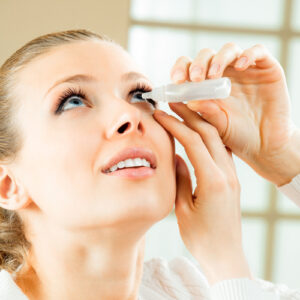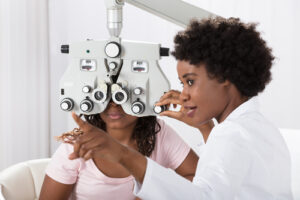It may feel like summer just started but fall is right around the corner! With fall comes going back to school and it’s also the perfect time to talk about seasonal eye care tips.
Keep reading for 5 seasonal eye care tips to remember as the weather gets cooler!
1. Remember your shades when you’re outside

Even though the weather is starting to cool down, the hot Georgia sun will continue to beat down on you. Whether you realize it or not, the sun’s rays contain UV rays.
Sunlight is the main source of UV radiation that people come into contact with. Anytime you go outside, you run the risk of coming into contact with UV rays.
This is especially dangerous for your eyes. Leaving your eyes unprotected is asking for problems! This can lead to your cornea becoming burned, early development of cataracts, or the development of pterygium.
Be smart and wear sunglasses whenever you go outside. Make sure that whatever sunglasses you wear provide 100% protection of UVA and UVB rays.
If you’re not sure, just check the label on the back of your sunglasses. A good pair will clearly state that they provide protection of UVA and UVB rays.
2. Avoid getting allergens like pollen in your eyes

The peak of allergy season is finally starting to wind down to the relief of allergy sufferers. But if you have allergies, you already know that there’s no magic switch to making them go away.
One thing that you can do to make having allergies a little more bearable is to avoid getting allergens like pollen in your eyes. Think about it.
Pollen is one of the most common allergens that people suffer allergic reactions from. The last thing you would want then, is to get pollen in your eyes.
This would lead to all sorts of uncomfortable symptoms like itchiness, watery eyes, swelling, and other discomfort. So how do you avoid getting pollen in your eyes?
Start by not wearing your contacts on days that have high pollen counts. Here’s why.
You have to touch your eyes, at a minimum, at least two times to put your contacts in and then again to take them out again. Most people that wear contacts also need to adjust them throughout the day at least once or twice.
That’s four times throughout the day that you may be touching your eyes. The problem with wearing contacts on high pollen level days is that you run the risk of pollen getting into your eyes and then causing an allergic reaction. Wear glasses on days that you know pollen levels are highest and give your contacts a rest.
3. Keep eye drops and artificial tears on you at all times

You don’t need to have an entire arsenal of eye drops and artificial tears on you, but it never hurts to be prepared! If you have allergies or know that your eyes tend to get dry, having eye drops and artificial tears on you is a good idea.
The thing you should avoid with these symptoms is letting them get out of hand. If your eyes feel dry, itchy, irritated, or like there’s something in them, use eye drops or artificial tears at the first feeling of irritation.
Waiting only gives your eyes more time to feel uncomfortable. You may even decide that it’s a good idea to rub your eyes (it’s not) and make them feel worse in the process. Stay in control and on top of your symptoms before they get out of hand!
4. Don’t spend too much time looking at screens

Sure, it’s tempting to spend hours scrolling through Instagram or watching TikTok videos, but your eyes are going to be the ones that pay for it. Too much screen time is not a good thing.
If you weren’t struggling with dry eye symptoms before, if you spend hours on your phone or in front of your computer, you will now. But what do you do if you want to enjoy your digital devices and not deal with the ocular consequences?
Well, start with some moderation. Too much of a good thing always turns into a bad thing, and your eyes are no exception.
If it feels like you’ve been staring at your phone for too long, you probably have. Take a break!
If you’re at work and you need to be in front of a screen, like your computer, there’s another solution. It’s called the 20-20-20 rule and it’s pretty simple to follow.
Every 20 minutes, take a break from looking at the screen you’re working on. Instead, look at an object that’s 20 feet away from you for 20 seconds.
That’s it! By practicing this handy trick, you’ll give your eyes time to refocus and recalibrate. You’ll also allow them to blink.
If you didn’t realize it, blinking is extremely important! Blinking is part of what keeps your eyes lubricated and moist.
When you spend too much time looking at screens, your blink rate can decrease by as much as 50%. This is why it’s common for your eyes to feel dry and scratchy after logging a few hours in front of your computer.
5. See your eye doctor on a regular basis

If your eyes are bothering you and you can’t remember the last time you had an eye exam or saw your eye doctor, it’s time to make an appointment. There’s not exactly a “right” answer for when you need to see your eye doctor, because the answer can change.
For children, this is different depending on age, as well as if they wear glasses or contact lenses. If they wear glasses or contacts, they should see their eye doctor once a year to have their eyes checked and to get a current prescription.
If you’re an adult but you don’t wear glasses or contacts, meaning you don’t have any refractive errors, you don’t need to see an eye doctor as often. This usually means you can see your eye doctor every year or two.
But keep in mind that if you find that your vision has drastically changed, your eyes are bothering you, or you have questions about your eye care, you should see your eye doctor sooner. Older adults should see their eye doctor more once they hit the age of sixty.
They are more likely to develop conditions like cataracts, age-related macular degeneration, and glaucoma at this age. They should see their eye doctor every year or every other year, or their eye doctor may want to see them more often.
If you’re not sure when to see your eye doctor, you can always ask them for a recommendation!
Have questions about your eyes, dealing with dry eye symptoms, or searching for answers when it comes to glaucoma? Schedule an appointment at Takle Eye Group in Griffin, GA!
Even if you’ve never made your eye care needs a priority before, it’s never too late to start!




